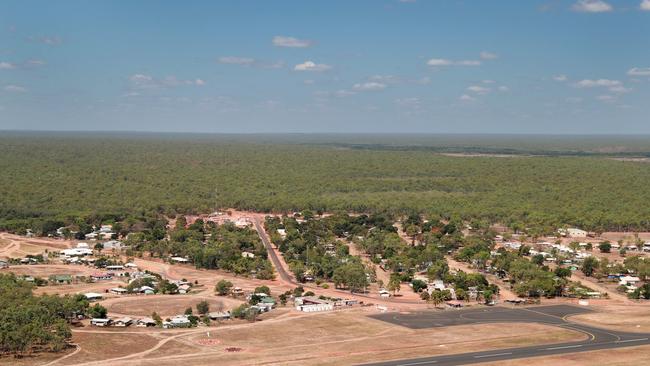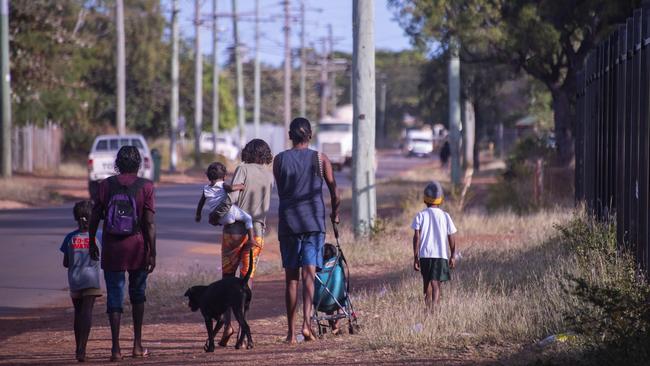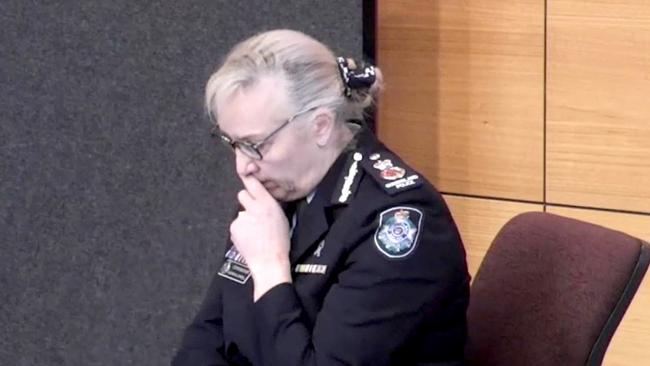Qld cops’ vile racist comments exposed in domestic violence inquiry
The Queensland Police Service Response to Domestic Violence has heard sickening accounts of the way officers refer to First Nations people.
Police & Courts
Don't miss out on the headlines from Police & Courts. Followed categories will be added to My News.
Police Commissioner Katarina Carroll has admitted there is racism within the service after another explosive day of evidence in the commission of inquiry where it was revealed officers had referred to First Nations people as “stupid black c…” and that the town of Aurukun should be “napalmed”.
The Commission of Inquiry into Queensland Police Service Responses to Domestic Violence also heard a dossier compiled by women police in 2017 and 2018 about their lived experiences included one who said she’d been raped and also knew of five other women who’d been attacked the same way.
The woman said she had been called a “slut” and “lesbian”, had cans placed on her crutch to “make sure she wasn’t hiding anything”, had been touched on the bottom, had her bra undone, had hands put down her front and was told to pull up her shirt for a “tit inspection”.
Counsel assisting the inquiry, Ruth O’Gorman KC, detailed a litany of examples of racism within the service, including one case where a sergeant teaching recruits at the academy said “you can smell them before you can see them” when referring to First Nations people.
Ms Carroll confirmed she had listened to a recording of the incident and had found it “extraordinarily disturbing”.
Ms O’Gorman said submissions received by the inquiry included incidents where police officers had referred to Indigneous people as “black c…”, “stupid black c…” and “lazy black c…”.
Other incidents included police officers being called “c..n lovers” by colleagues and one case where an officer said “we should just napalm Aurukun”.

Another said: “We should sack all the PLOs (police liaison officers) and put the money into more police.”
Others complained that police liaison officers “stink out” patrol cars.
“It has been brought to my attention obviously, and it’s absolutely disgusting,” Ms Carroll said.
The inquiry was told about an Ethical Standards Command investigation where an officer in charge of 13 police liaison officers was accused of bullying and unprofessional conduct.
The inquiry was told the officer was accused of swearing at his staff, using obscene language, threatening their job security and said “if it wasn’t for (the police), they’d still be driving taxis”.
Ms O’Gorman said the police liaison officers had never been taxi drivers.
She told the inquiry senior police referred the officer’s conduct for disciplinary action but instead it was dealt with by local managerial guidance.
Ms Carroll agreed the system that allowed discipline via local managerial guidance - which involves a conversation with a more senior officer - was “broken”.

She admitted many of her officers were inappropriately dealt with in this manner and that she needed “no confidence powers” allowing her to dismiss police not fit for the job.
“I genuinely believe I need such a power,” she said, adding that there should be an appeals process that goes with it.
“There always has to be procedural fairness and natural justice.”
Ms Carroll spoke about her own experiences with sexual harassment and assault in the 1980s and 1990s following hours of evidence about women who had been targeted by male colleagues.
“A number of times throughout my career, what happened to these women and other women, exactly happened to me,” she said.
“I was pretty well attacked by what I’d say was a sexual predator.
“He took me to a forest and started taking my seatbelt off … (my colleagues at my) station protected me.”

Ms Carroll endured uncomfortable questioning about whether she had ever visited her specialist Domestic Violence Command, set up after the murder of Doreen Langham, and whether she had done anything about it being severely short-staffed.
She was also questioned on the establishment of a First Nations reference group set up to advise her on cultural issues, who said she did not meet with them when they made multiple requests to do so.
The inquiry touched on the murder of police officer Senior Constable Brett Forte who was gunned down by domestic violence offender Ricky Maddison in 2017.
Commissioner of the Inquiry Judge Deborah Richards told Ms Carroll it was a “bad look” and “should never have happened” that attempts were made to discipline his widow Susie and police partner Cath Nielsen - both senior constables - after they raised questions about whether his murder could have been prevented.
Commissioner Richards said attempts were made to discipline the women for failing to report misconduct after they made allegations at an inquest.
“Very harsh to charge someone who’s lost their husband with failing to report (misconduct) … that should never have happened, should it?” she said.
“Thankfully Ethical Standards Command put a stop to that charge.”




